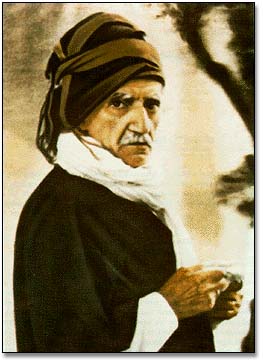- Said Nursî
Infobox_Philosopher
region = Islamic Thinker
era = 19th-20th Century
color = #B0C4DE

image_caption = Said Nursî praying in front of the Fatih Sultan Mehmed Tomb in Fatih Mosque in Istanbul
name = Said Nursî
birth = Between January 5 and March 12, 1878
death =March 23 ,1960
school_tradition = -
main_interests = - Restoring Faith
- Proving Existence and Oneness of God
- Proving Resurrection
influences = Qur'an, Imam Ali, Ash'ari, Ibn Arabi
influenced =Fethullah Gülen ,Adnan Oktar
notable_ideas = Risale-i Nur CollectionSaid Nursî (1878, [ [http://www.koprudergisi.com/index.asp?Bolum=EskiSayilar&Goster=Yazi&YaziNo=502 An article about the birth date of Said Nursî which exist in a magazine named "Köprü"] ] village of Nurs, Bitlis Province –
March 23 ,1960 , Urfa) was anIslam ic thinker fromTurkey of Kurdish origin and the author of the Risale-i Nur Collection, [ [http://www.nur.org/treatise/biography/from_Bediuzzamans_life09.htm From Bediuzzaman Said Nursi's Life: Birth and Early Childhood] ] aQur'an ic commentary exceeding six thousand pages. He was also known as Bediüzzaman by his followers, which means "the wonder of the time."Family background and youth
He was born in 1878 in Nurs a village of Bitlis Province. As a boy, he was sent to study under the eminent scholars of the surrounding cities. He memorized the manuals of the classical Islamic fields of knowledge in a short time. Because of this feat, he was given the honorific title "Bediüzzaman," with which his followers use to refer to him. Bediüzzaman means "the wonder of the age".
The "Early Said"
Due to his fame as a scholar, he was invited by the governor of Van to stay in his residence. In the governor's library, Nursî gained access to the entire scientific knowledge he did not encounter during his studies. Moreover Said learnt proper Turkish there. During this time he developed a plan for a university for the Eastern provinces of the
Ottoman Empire . By combining scientific and religious education, the university was supposed to help remove the backwardness of these areas. [ [http://www.nur.gen.tr/en.html#maincontent=Risale&islem=read&KitapId=19&BolumId=774&KitapAd=Biography+of+Bedi%u00fczzaman+Said+Nursi&Page=41 Biography of Bediuzzaman Said Nursi] - pg.41]The "New Said"
He was finally exiled to the village Barla (prov. Isparta). His teachings attracted many people in the area. These manuscripts were sent to Sav, another village in the region where dozens of people duplicated them in
Arabic script which was officially replaced by theLatin script in 1928. After being finished these books were sent to Nursî's disciples all over Turkey via the "Nurcu postal system."Bediuzzaman's study of science and involvement with philosophy should be seen in the context of the increasing Western influence in the Ottoman Empire at the end of the l9th and early 20th centuries and the attacks which were being made on the Qur'an and Islam in the name of science and materialism, and Positivist philosophy in particular; it was in order to answer these attacks.When the leadership of Turkey came into the hands of Mustafa Kemal and his supporters on the founding of the Republic, the drive for Westernization received a strong impetus, and philosophy was progressively inoculated into the Turkish people.The "Third Said"
He was finally released in 1949. In the last decade of his life he settled in
Isparta . After the introduction of the multi-party system he advised his followers to vote for the Democratic Party ofAdnan Menderes which gained the support of the rural and conservative populations. Because Said Nursî consideredcommunism the greatest danger of that time, he also supported the pro-Western orientation of the Democrats (NATO -membership,Baghdad treaty , Turkey's participation in theKorean war ). He tried to unite Muslims and Christians in the struggle against communism andmaterialism therefore he corresponded with thePope and the Greek Orthodoxpatriarch . [ [http://www.nur.gen.tr/en.html#leftmenu=Risale&maincontent=Risale&KitapId=19&islem=read&BolumId=864&KitapAd=Biography+of+Bedi%u00fczzaman+Said+Nursi&searchText=vatican&SearchType=1&SearchStyle=1&Books=0&pindex=1&Page=441 Biography of Bediuzzaman Said Nursi - Part Two (The New Said)] pg.441] In 1956 he was allowed to have his writings printed.He died of exhaustion after traveling to Urfa. He was buried in the premise where according to Islamic beliefs
Abraham (Ibrahim) is buried. After the military coup d'etat in Turkey, a group of soldiers led by the later extreme right-wing politicianAlparslan Türkeş opened his grave and buried him at an unknown place near Isparta during July 1960 in order to prevent popular veneration. [ [http://www.zaman.com/?bl=1960militarycoup&alt=&hn=36483 Nursi's Letters Found in Yassiada Archives] , Zaman] His followers are reported to find his grave after years of searching in the area, and took it to a secret place in an effort to protect his body from further disturbance.Fact|date=November 2007References
* Islam and Christian-Muslim Relations: Volume 19, 2008, № 1 - all articles devoted to Said Nursî.
Wikimedia Foundation. 2010.
